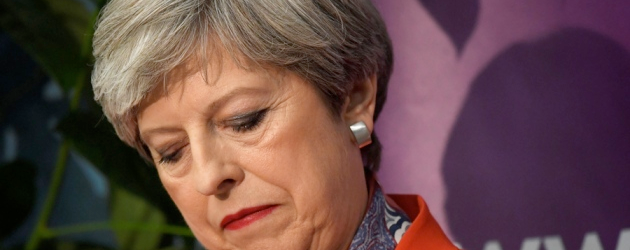Having flown out to Florence last week on taxpayer’s money to deliver the speech that was intended to kick some life into deadlocked Brexit talks, it’s worth looking back at some of this year’s stand-out dismal failings for the Tories and how 2017 has been nothing short of catastrophic for them.
1. Election Fraud Allegations
In March of this year, the Electoral Commission slapped an unprecedented fine of £70,000 on the Tories over electoral spending reports. Condemnation of the wilfully obstructive behaviour of the Tories was part and parcel of the decision to wallop such a large fine upon them. Among their listed reasons for the fine, the Electoral Commission stated:
152. In determining this penalty the Commission took into account the following factors:
The harm caused to confidence in the party finance regime represented an aggravating factor, in light of the value of the payments and the campaign to which they related. The omission of supporting information undermines the ability of the Commission and the public to review and verify the spending figures within the return. There was a consequent impact on transparency and most likely, as a direct result, on public confidence.
The unreasonable uncooperative conduct by the Party during the investigation, of which this offence was one element, which delayed without good reason and for a number of months the provision of information needed to progress the investigation.
The Party has now provided the missing invoices and receipts. However, these were only provided as a result of the Commission’s inquiries:
Following police investigations into Conservative Party candidates’ expenditure during the 2015 General Election, the CPS issued a statement in May 2017 confirming that it would not be bringing any criminal charges against specific Tory candidates, one of whom was my own local MP, Marcus Fysh (Yeovil constituency).
Following news of the CPS decision, the Tories were quick to condemn the allegations/investigations as a politically motivated witch-hunt. Theresa May stated:
“The CPS has decided – they are an independent body – they have decided that no charges will be brought against any candidate in relation to this matter. Candidates did nothing wrong. It’s very important and I repeat that – I have said it many times – candidates did nothing wrong.”
And…
“[The CPS] confirmed what we believed all along” – that “local spending was properly reported”.
However, her statement is a gross misrepresentation of what the CPS really said, which was that some of the offences investigated lacked sufficient evidence to prove criminal liability, and those where a technical offence had been committed, the CPS were not going to prosecute as they did not believe it was in the public interest to do so. All of which, taking into account the Electoral Commission’s findings, clearly show that it was not the case that Tory candidates had done nothing wrong.
Saying there is insufficient evidence to prove criminal liability is not the same as saying they were cleared as totally innocent. Something went very wrong with those reports, and £70,000 fines do not get dished out when you’ve done nothing wrong.
2. Snap General Election & the DUP
Having made repeated promises that no snap general election would be called, a snap general election was called. The Tories’ woeful campaign included such memorable highlights as Theresa May’s persistent refusal to engage with the electorate on street level and on televised debates, prompting people to claim that she couldn’t even be bothered to show up for the most significant job interview she’d ever put herself forward for.
Having lost more than six seats, suffering a net loss of 13 seats, the Tories formed a minority government off the back of their controversial “Supply and Confidence” deal with the Democratic Unionist Party. This was despite frequently repeated claims throughout the campaign that should the Tories lose just six seats, Corbyn would be the man sent off to negotiate Brexit.
Elect a “Strong and Stable” Tory government, we were told, not a “Coalition of Chaos”. What we got was a coalition of chaos anyway, with the less than ideal DUP and a catastrophically weakened Tory party on its knees in front of the eyes of the world – just days before Brexit negotiations were due to commence.
To say the election backfired on the Tories would be an incredible understatement. And yes, mainstream media…we KNOW that Labour did not win. But, despite having more seats, neither did the Tories. They managed to fluff the election up and make themselves look like total buffoons in front of the very people they’d soon be getting down to serious talks with.
Also, there’s something really quite unsettling about the fact that the Tories managed to find £1billion of taxpayers’ money to bung to the DUP just weeks after Theresa May appeared on BBC’s Question Time and patronised a desperate NHS nurse in the audience that there wasn’t money for a public sector pay-rise because she didn’t own a magic money tree.
She sure as hell found £1billion from somewhere, though.
3. U-Turns
Prior to the 2016 referendum result, David Cameron claimed that no matter what the result, he’d stay in office to see the decision through. It didn’t last, of course. As soon as the country returned a vote that he didn’t expect, he was dashing for cover with his tail between his legs.
Theresa May’s decision to call a snap general election was, of course, a significant U-turn in itself, having promised several times that it wouldn’t happen. But even by July, it seemed the Tories were in chaos and couldn’t make a firm decision between them.
On the 18th May, the Tories said that they would drop the pensions triple lock and downgrade it to a double lock, a U-turn on their manifesto commitment of 2015. In another manifesto U-turn, they also stated that they would means-test Winter Fuel Payments, meaning that they would no longer be a universal entitlement for pensioners.
The 22nd May one of the quickest U-turns occurred: in their 2017 manifesto, the Conservatives announced reforms to the social care system which became widely referred to as the “dementia tax”. Following an incredible public outcry, the Tories backtracked on the policy just four days later and Theresa May appeared to struggle to convince even herself that “nothing had changed.”
On the 20th June the Tories changed their minds about the sequencing of Brexit negotiations, having previously confirmed that their intention was to agree the terms of Britain’s future relationship with the EU before moving on to divorce arrangements. The EU made it clear they wanted the negotiations to run in the opposite order and the government promptly buckled.
In May, the Tories said that they wanted to introduce a cap on energy costs. By early July, the Prime Minister faced a considerable backlash from Tory MPs demanding that she follow through with the proposal upon which she’d subsequently U-turned.
On 26th June, the Tories performed a 360-degree turn on the triple lock pensions promise. Not only that, but they also reversed their U-turn on means testing Winter Fuel Payments.
On the 28th June, reports emerged that the Tories were considering a review of the 1% public sector pay cap. Later that day, it was confirmed that this would not be happening.
On the 29th June the government reversed its decision on funding for abortions in Northern Ireland. Earlier in the year, they’d fought a Supreme Court case defending their decision not to fund abortions, but on the 29th June the government performed a U-turn on this.
On the 4th July the Tories U-turned on a decision made in May to scrap free school lunches for children.
By the 12th September, the Tories had decided to U-turn on their decision not to lift the public sector pay cap, although their decision has been met with some criticism as firstly it only applies to the police and prison services, and secondly, it must come from their own budgets – something which will clearly stretch their own funds.
4. Brexit
Friday 22nd September 2017, and Prime Minister Theresa May delivered her speech to the media in Florence, Italy. It was widely speculated that she had to do something to unlock the deadlocked Brexit talks. In doing so, however, Theresa May has found herself having to defend against claims that she’s betrayed the Brexiteers. The two-year transition period she now wants is not what they voted for. Brexiteers want Brexit. They want out of the EU and all that this entails.
It’s easy to see why Remainers feel angry, too. Although better than a “cliff edge” break from the EU, what we’ll get is what I’ve opposed all along, which is access to the single market, a bill for several billion pounds, but without a seat at the Big Boys’ table. In other words, British taxpayers’ money will go to the EU and in return we’ll maintain this two-year access to the single market, having surrendered ourselves to being bound by rules we’ll no longer have a right to have a say in.
It’s pretty unsatisfactory from all fronts. And as far as both the Brexiteers and the Remainers are concerned, it is not what either of us want.
5. Acting Above the Law
I take the view that several recent episodes establish our government’s propensity to show total disregard for law and democracy itself. Following the referendum result, businesswoman Gina Miller launched a legal battle against the government with an aim to challenge their authority to trigger Article 50 without the matter first being put before Parliament. Having won this case, the government appealed the decision in the Supreme Court. The decision was upheld. What this means is that the government was perfectly willing to impose its will upon the people, rather than democratically carrying out the so-called “will of the people.”
Home Secretary Amber Rudd has faced recent criticism over her dealings with the deportation of Mr Samim Bigzad. The Home Office has been accused of defying three court orders from senior judges in deporting the 22-year-old asylum seeker, who fled Afghanistan in fear for his life. Critics are now calling for Amber Rudd to resign following what they say is an action in contempt of court.
Theresa May’s utter failure to secure the majority she craved, claiming that it would strengthen her hand in the Brexit talks, led to this unsettling “Confidence and Supply” deal but it has now transpired that Gina Miller is launching another legal battle against the government on the basis that Theresa May once again attempted to exceed her authority promising £1billion of taxpayers money – a decision that needs the consent of Parliament.
Finally, the EU (Withdrawal) Bill received a great deal of criticism when it hit the news as one of its most contentious proposals, named the “power grab”, is designed to give the Tories power to make law without Parliamentary scrutiny. The inevitable comparisons to Hitler’s Enabling Act ensued, and the Bill – although having passed the second reading stage in the House of Commons on the 11th September 2017 – provides yet another example of the Tories’ seemingly current disregard for the principles of democracy.
6. Grenfell Tower
The terrible tragedy at Grenfell Tower on the 14th June this year spoke volumes to the people about life under the Tories. This awful event has widely been accepted as avoidable, although quite where the blame lies for it remains to be seen. But blame lies somewhere – these things do not ‘just happen’ without some measure of accountability, and although there may be historic elements in place which culminated in the tragedy, there are undeniably valid arguments to suggest failings within the current Tory government.
They did not do themselves any favours following the tragedy, either. The aloof manner in which the Tories responded/failed to respond to the incident led to immense levels of outrage. Anyone who criticised the Tory government were condemned for politicizing the event and using it to score political points. Unfortunately, the tragedy at Grenfell Tower was very much a tragedy arising out of political decisions.
In the aftermath, the Tories received the brunt of the Nation’s anger as evidence began to emerge that suggested key Tory officials knew of the risk to this building but ignored certain reports, yet Tory MP Marcus Fysh used his allotted time in Prime Minister’s Questions on the 28th June to butter-up the Prime Minister in an obviously scripted show of slimy, sycophantic kow-towing – designed, it would seem, to address the general mood of the Nation by re-asserting the Conservative opposition to the ideology of socialism. However, Assistant Editor of The Spectator, Isabel Hardman tweeted that it was one of the most pointless questions she had heard asked in Parliament.
Marcus Fysh asked: “Is the Prime Minister aware of the current crisis in Venezuela? And is this an example of how an experiment in socialist revolution can go horribly wrong?”
The Prime Minister replied, after chuckling at the jeering and the laughter and the shouting in the chamber: “I have to say to my honourable friend that I think he’s made an extremely important point…And I hope the leader of the opposition has heard what he had to say. Indeed, I have to say sometimes when we’re talking about trade deals in the future, I think that the leader of the opposition and his shadow chancellor think that the only good trade deals are with Venezuela, Cuba and North Korea.”
But there was nothing funny about any of this. What Marcus Fysh had done – and which he subsequently denied on social media – was the very thing he and other Tories condemned following the Grenfell Tower tragedy…he used the tragic loss of life to make a political (if completely misinformed) point. The thing that made it worse, in this case, was the jocular manner in which it was done – evidenced by the uproar of laughter he, the surrounding Tory MPs and the Prime Minister responded with.
With the Tories, double-standards are perfectly fine it would seem.
With all this, and other key issues in mind, I can’t help but wonder whether 2017 will be the year remembered for marking the downfall of the Tories.
I suppose one can only hope.




